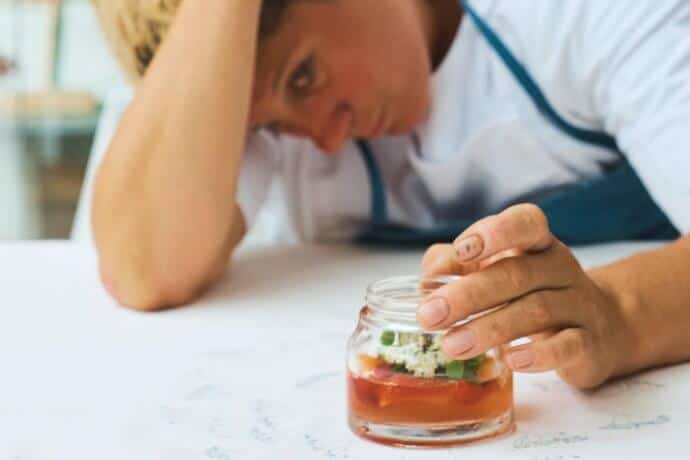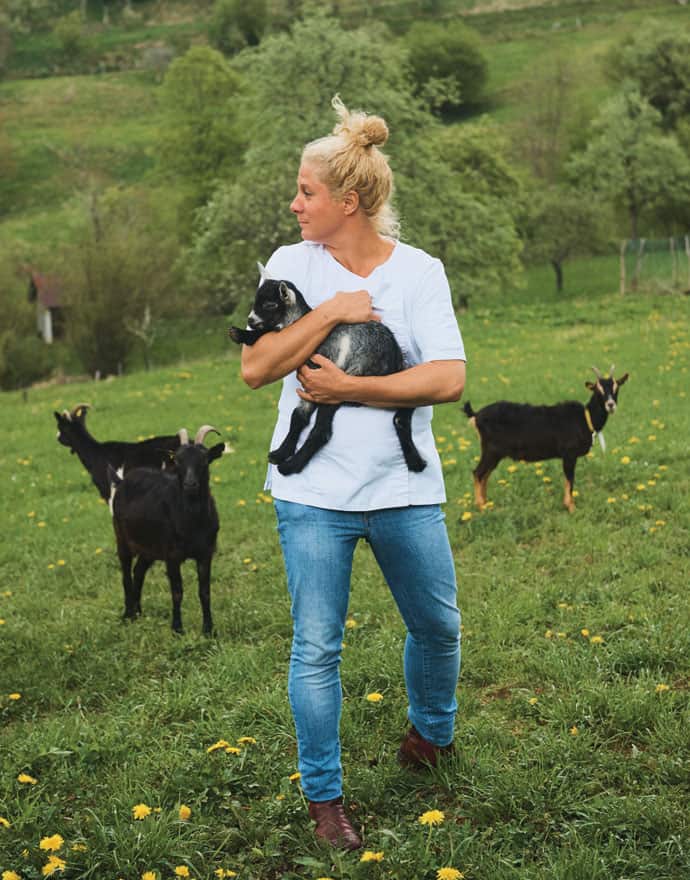
Foto: Hiša Franko
Mario C. Bauer holt mit seinem Videopodcast Teddy Talks die Protagonist*innen der europäischen Gastronomie vor die Kamera. Jetzt hat er zusammen mit Barbara Schindler von Das Presstaurant das Buch „Teddy Talks – Conversations about Love & Food“ mit Essenzen ausgewählter Interviews publiziert. Wir veröffentlichen daraus exklusiv das Gespräch mit der slowenischen Köchin Ana Roš. Die Betreiberin des Hiša Franko zählt zu den besten Köchinnen der Welt und wurde von der berühmten Netflix-Serie „Chefs Table“ portraitiert.
Der Text ist wie das ganze Buch, in dem u.a. auch der Metzger Dario Cecchini und Ralf Bos (BoosFood) portraitiert werden, englischsprachig. Die Erlöse aus dem Buchverkauf (111 Seiten, 29,90 Euro) gehen an das St. Anna Kinder-Hospital in Wien.
“Love is crucial. Without love it’s difficult to work well,” says chef Ana Roš. “It’s because love is always related to passion. And without passion, everything you do is half-way.” The self-taught chef was named ‘the World’s Best Female Chef’ in 2017, 15 years after taking over her husband’s family’s restaurant Hiša Franko.
She was the first to put Slovenia on the culinary world map and might be the most famous woman from the country besides Melania Trump. “This was only possible because I put passion in everything what I did,” she explains. “I often struggled and had many questions. But if you don’t have passion you don’t succeed. But a passionate restaurant owner also needs also a passionate team to create enthusiasm among her guests.

Foto: Hiša Franko
“Last night we talked about how to get more passion in our service staff,” Ana explains. “And the strange thing is, in the kitchen we have the opposite problem: our chefs are so passionate that they don’t look left or right. They are completely loyal and dedicated to the house. So our head chef wanted to talk to the service people. But passion is something you can’t put into people. Those who are not passionate will not stay with us for a long time.”
1st, 2nd, 3rd, 4th and 5th on our priority list is what’s in the bottle.
Having started a career as professional skier, planning to become a diplomat afterwards, Ana Roš is convinced that everything she did in her early life was important to help her when she took over the restaurant. “From my sports career I have discipline and focus as well as the ability to improvise. The world of diplomacy gave me a large horizon and a broader perspective. Studying is always important as it shapes your personality and point of views,” she says. “I think the best chefs in the world today are those who are very opinionated and have large horizons. More and more of them, by the way, are self-taught.” Her success, she notes, is a patchwork of what she did in her life.
Ana reflects on what it meant for her intellectual parents that their daughter wanted to become a chef in a country where gastronomy did not have a high reputation at that me: “My mother was a journalist, my father a doctor. They were used to work with their heads much more than with their hands. Children with excellent results in school didn’t start in gastronomy at that me; it was rather for those with not so good education. When I told my parents I would give up my diplomatic career to cook in the countryside, it was tough for them because they could not imagine I would succeed. Later they were very supportive and proud, even though to my mother, coming from an aristocratic family, cooking is still a low-class job.”
Paying the ‘real living wage’ had a massive impact on our team turnover, our engagement, our customer service scores and our like-for-like sales performance.
Although she is loved by the international food scene and media, Ana Roš is often criticized in her own country for addressing problems too openly. “It’s sometimes brutal and what hurts me most is what is said inside our restaurant industry. We have ambitious and very interesting young chefs for whom Hiša Franko is the path to the future. I am very supportive towards them and we have a great community. But on the other hand, there are old-fashioned food journalists and wanna-be chefs who envy my success.”
Last year, Ana invited around 120 people to Hiša Franko: “Food journalists, wine professionals and chefs who used to comment negatively on us without ever having been to this house. We did an amazing dinner with 25 courses. They saw us working. And now they know us and don’t have to judge us from what they read in interviews. We will do events like this twice a year now.”
Another challenge for Ana is to organize family and business life, running the restaurant together with her husband. “Family is a very important nucleus. We feel that especially when we are traveling together. On the road you learn how your family really works. If your family is strong, you can resist all the pressure of your everyday life. But it can only be strong if you give it me.” Couples working together should therefore take a lot of me outside the business with phones and computers turned off. “You must force yourself not to talk or think business, which is very difficult,” the chef observes. For her two children, she hopes the restaurant and their parents’ work will not be a burden.
“They love being here and what we are doing. Their friends ask them for my autograph… – so they see me as their hero. But we will not push them in any direction or stop them from pursuing their dreams. Whatever they do is theirs.” Calling herself a “super-doubtful person,” Ana is convinced that failure and doubt are the engines of progress. “Whatever I do, I am sure it will not work in the beginning. I need the input of others to overcome that doubt. You carry an idea and you don’t sleep well and sometimes you wake up in the morning and you know: I have it!”
Great businesses, great entrepreneurs und great teams always have an incredible amount of determination and resilience.
Even as “best female Chef in the world,” Ana Roš is not convinced that she has reached the maximum of her own potential. “I am maybe at 7 out of 10,” she says. “I know my weak points. But, yes, I am also very strict towards myself. It is a trait of character I inherited from my father who at the age of 75 still is very disciplined.” Consequently, she worked so hard for her success that she also deserved a good portion of luck. “I think lazy people never have good luck.
However, in the beginning we didn’t work to have three Michelin stars and 40 people on our payroll. We simply worked to survive in a place where there was no infrastructure and no other restaurants around. Without our philosophy, our guests would not have come here.” Good luck allowed her to meet the right people at the right me. “Luck is important, but much more important is your struggle. If you only have good luck you will finally fail, because your walls are not stable enough. You must build a stable house first.”
Life also told her to believe that there is no problem that can’t be overcome. “Sometimes you have to expose yourself to what hurts you. It’s important not to give up. Then you can become a true champion!

